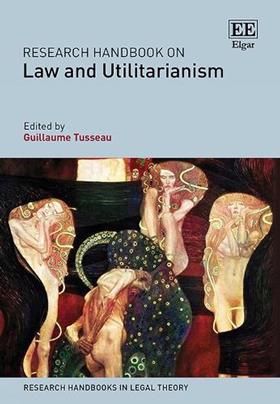Research Handbook on Law and Utilitarianism
Edited by Guillaume Tusseau
£220, Edward Elgar
★★★✩✩
Utilitarianism and law are not exactly strange bedfellows – more kissing cousins. The doctrine can be broadly defined as the concept that what is morally good may be determined by whether its consequences benefit the community as a whole. Arch-utilitarian John Stuart Mill argued that ‘actions are right in proportion as they tend to promote happiness, wrong as they tend to produce the reverse of happiness’.
This collection of essays discusses what utilitarianism may contribute to legal issues. The content is varied, covering topics as diverse as commerce, crime, migration, animal law, and AI. If this work is anything to go by, few fields of law could be untouched by utilitarianism. Jean-Pierre Cléro claims in his chapter on utilitarianism and religion that ‘utilitarianism is so common in Anglo-Saxon countries that nobody would dream of not taking it into account in considering political, legal, economic, ethical and moral issues, even without conforming to that doctrine’.

This is a genuinely interesting work – especially the chapters on killing and healthcare, which feel incredibly topical – although at over 400 pages it is a dense and at times exhausting read. A book to dip into where a chapter is of particular interest rather than to read cover to cover. At over £200, it is not one for general readers, although academic lawyers and philosophers might want to encourage their librarians to seek it out.
That said, the work gave me food for thought. The chapter that particularly struck me discusses ‘Nudge Theory’, a concept in behavioural economics which purports to enable the choices of individuals and groups to be influenced in ways that a third party – such as government or a corporate entity – might wish. Allied to a creed that reduces morality to a mathematical equation, this presents a disconcertingly Orwellian vision.
A government wholly embracing utilitarianism would be a disturbingly overbearing and technocratic enterprise. It would be a supreme legislator straight from the pages of Hobbes’ Leviathan, constantly tinkering with the law in relentless pursuit of the greatest happiness for the greatest number of its subjects, while ceaselessly nudging them to make the ‘right’ choices. It is, perhaps, better that utilitarian views of law remain in academic works like this, rather than being tested in the real world.
James E Hurford is a solicitor at the Government Legal Department, London































No comments yet